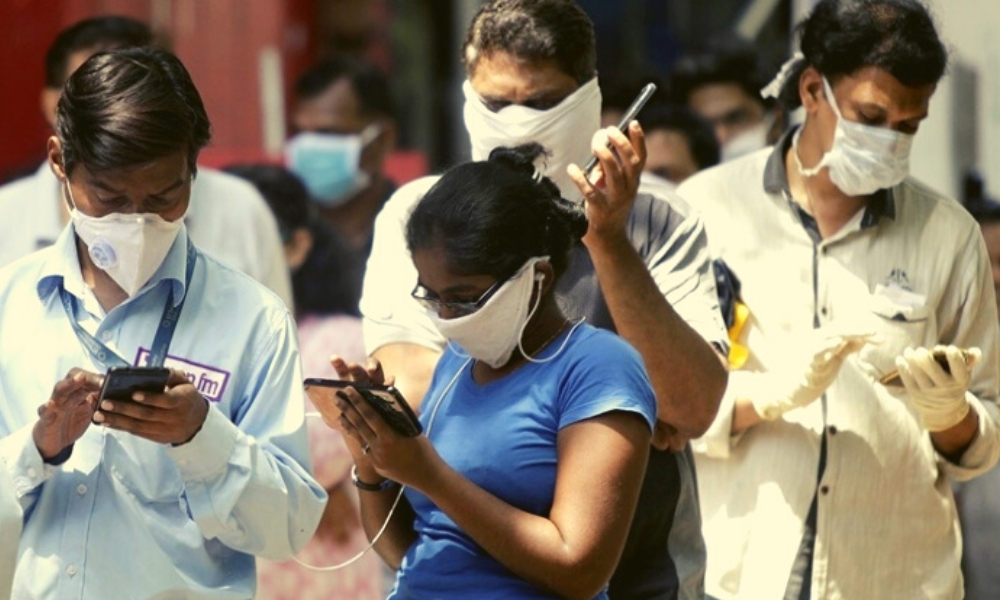
Credits: ANI
One in Three COVID Infections, Deaths Worldwide Reported From India
Writer: Devyani Madaik
A media enthusiast, Devyani believes in learning on the job and there is nothing off limits when it comes to work. Writing is her passion and she is always ready for a debate as well.
India, 5 Jun 2021 9:22 AM GMT | Updated 5 Jun 2021 10:11 AM GMT
Editor : Sanal M Sudevan |
Keen to explore new things and learn something new every day in the field of jounalism.
Creatives : Devyani Madaik
A media enthusiast, Devyani believes in learning on the job and there is nothing off limits when it comes to work. Writing is her passion and she is always ready for a debate as well.
India has witnessed a decline in the number of COVID cases but the reliability of data cannot be ascertained as many reports have stated discrepancies between the official figures and on-ground reports.
In the last 24 hours, the country recorded 1.20 lakh new COVID-19 cases and 3,380 deaths. With this, the total tally of infections stands at 2.86 crore (28,694,879) with 3.44 lakh (3,44,101) fatalities and 2.67 crore (26,795,549) recoveries.
Although there has been a slight decline in the number of new infections, one in every three new infections globally, is reported from India. The country also continues to record one in three average daily fatalities in the world. The daily and weekly average positivity rate has seen a decline.
On Monday (June 4) alone, India recorded the maximum number of cases worldwide, with 1,13,261 new infections, and 2,059 new deaths.
These figures (new cases and fatalities) exclude more than seven states, including Chhattisgarh, Bihar, Punjab, Jharkhand, Uttarakhand, Manipur, Arunachal Pradesh, Andaman and Nicobar Islands and Ladakh, The Hindu reported.
On Thursday, June 3, Union Home Minister Amit Shah said the country has successfully fought the battle against the pandemic under Prime Minister Narendra Modi's leadership. He was referring to the decrease in the number of cases and praised the citizens for their contribution.
"Now, the cases are dipping, the number of patients is decreasing. The oxygen requirement has come down to 3,500 MT from 10,000 MT. This indicates that the COVID-19 curve is going down," NDTV quoted the minister as saying.
Shah informed that the demand for oxygen, which had shot up to 10,000 metric tonnes (MT) a day, from the previous year's demand of 1,000 MT, came down to 3,000 MT.
Is Data Reliable?
Experts have noted that the data of decline in cases could not be considered reliable as the testing is not being rigorously conducted in rural areas. The virus is spreading like wildfire in remote areas and might delay the recovery period further, World Health Organisation (WHO) chief had recently pointed out.
Another issue that persists is the lack of testing, which remains a challenge for the country. The Union Health Ministry last week suggested that more than half of India is still not conducting testing enough. Of the 741 districts in the country, 382 have a positivity rate higher than 10 per cent, reports read.
"And so the absolute numbers don't mean anything when they are taken just by themselves; they need to be taken in the context of how much testing is done and test positivity rate," the WHO chief said. Hence, the lack of testing undermines the reports of a decline in cases.
The paucity of data has also compromised India's efforts in fighting against the pandemic. Recent reports stated the government's struggle to put together appropriate data - the number of tests conducted, number of doctors, bed capacity, availability of essential medical equipment such as ventilators, number of people admitted in the hospital, readmissions, and so forth.
The under-reporting of deaths is another major issue. Recent reports also found discrepancies between the official data of COVID-19 fatality figures released by the state governments and on-ground reports.
The Centre and state governments, to its credits, have reported a decline, but it is not clear whether it includes the demographic and socio-economic profiles of people and cases reported at sub-district levels.
 All section
All section














